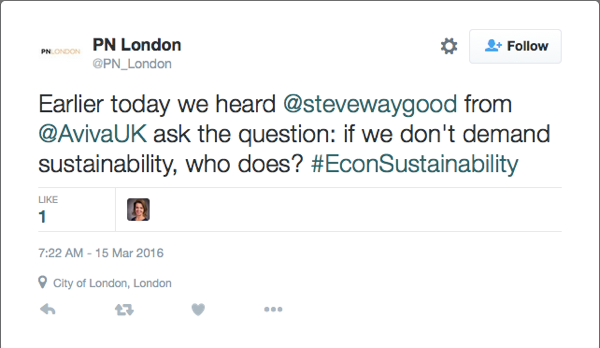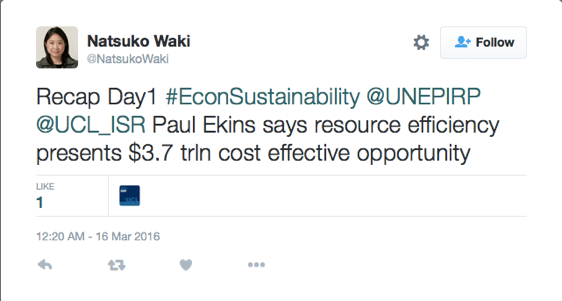The Economist Events’ recent Sustainability Summit in London opened with a strong argument: “There will be no jobs on a dead planet,” said Sharron Burrow, the General Secretary of the International Trade Union Federation. If for no other reason, that’s why businesses need to act on sustainability – their existence depends on it.
Timothy Williams, Africa Director of the International Water Management Institute (IWMI), and Tony Allan, Emeritus Professor, King's College London and SOAS London, represented the CGIAR Research Program on Water, Land and Ecosystems (WLE) at the summit, which set out to explore what role businesses and investors should play in achieving sustainable development. This post summarizes some of their reflections on the summit’s discussions and their implications for WLE and CGIAR in general.

More reflections on the Sustainability Summit? Read “Why wrecking the planet is bad for business” by Fred Pearce.
Sustainability is cost efficient
Reflecting on his attendance, Allan highlights the keynote presentation by Paul Ekins OBE, Professor of Resources and Environmental Policy, University College London, who spoke on the Sustainable Development Goals and business.
Ekins presented the sustainability challenge in a slightly different light than Burrow, arguing that resource efficiency represents a cost effective opportunity, and therefore businesses would do well to invest.
Especially when considering environmental externalities, savings on implementing sustainability measures in business are significant, he argued.
Ekins also stressed the need to put in place policy concepts that can support investments in resource efficiency, such as by enabling a focus on waste reuse and recycling. This is a challenge that IWMI is already working on, including by examining most promising business models for resource recovery and reuse of human waste and wastewater.
“It was a timely and very comprehensive talk,” says Allan.
Green investments few and far between
One of the main messages that Allan took away is that responsible investment is appropriate and necessary. “But banks and other investors are not yet signaling convincingly that sustainability principles should be as important as bottom line outcomes,” he said.
This view is supported by a presentation given by Steve Waygood, Chief Responsible Investment Officer, of Aviva Investors, who urged investors to communicate their green preferences to the companies in which they invest.
Waygood imparted the message that today’s CEOs and CFOs are not leading strongly enough – they need to be reminded that their investors are responsible.
What about water for food?
While Ekins and others discussed the relationship between energy and water, not enough attention was given to sustainability in agriculture, according to Timothy Williams. “Natural resource management for agricultural production and the existential implications for smallholder farmers and poor rural dwellers across the developing world did not receive enough attention,” he says.
Allan agrees: “The interlinkages between water and food production were not well addressed.” And, that’s despite the fact that farmers consume close to 90% of the water that society uses.
Only Mark Suzman, of the Bill & Melinda Gates Foundation, gave a presentation focused on agriculture, specifically in Africa. “He highlighted the human dimension of sustainability, which concerns millions of people without a voice, and he asked questions such as ‘how can we make investments now that will contribute to long-term social, environmental and economic improvements for everyone, everywhere?’” explains Williams.
Suzman went on to say that future investments should focus on zero-carbon energy sources, global agricultural research, irrigation and small-scale water management solutions for smallholder farmers, and improved data systems.
These views are in line with previous research supported by IWMI and WLE, which has suggested that investments in motorized pumps for small-scale irrigation could benefit 185 million people across Africa, generating net revenues of up to US$22 billion/year.
More inclusiveness, please
Generally, having a more diverse range of speakers and competencies present at the event, such as in the form of academics or non-profit sector representatives, could have enriched discussions. “The summit was not a CSR (corporate social responsibility) fest,” Allan says. “But, at the same time, with the private sector strongly represented and only a few speakers from other fields, the private sector perspective was mostly left unchallenged.”
Allan points out that scientists in particular might be able to bring a broader, system-level perspective on natural resources consumption and efficiencies – including on the topic of water for food production.
In addition, it is pertinent, Allan says, to hear more from energy corporations. Energy scientists, energy economists and the general public are all reaching consensus on the need to act on rising global temperatures by bringing down emissions and carbon consumption, but energy corporations often do not participate in the debate.
Williams supports the appeal for greater inclusiveness: “Not a single practicing farmer or representative of a farmer organization was featured on the speakers’ list. This is a shortcoming that future summits need to address.”
In conclusion, just as development- and research-related events often do not include private sector interests, the summit lacked a diversity of perspectives. But, it must be recognized that the sustainability challenge cannot be solved by anyone sector alone, neither the public nor the private. Maybe next year’s summit will bring together a wider variety of voices?










/index.jpg?itok=EzuBHOXY&c=feafd7f5ab7d60c363652d23929d0aee)








